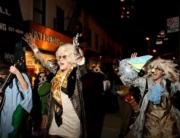At first, this absorbing documentary seems like a chronicle of a major political event in Zimbabwe: the rise of the Movement for Democratic Change party, or the MDC, to the presidency. Opening four weeks before the 2018 election, the signs are encouraging for 40-year-old activist, attorney, and party leader Nelson Chamisa, who is met by large and enthusiastic crowds at campaign rallies. There is a sense of electricity in the air as he offers a vision of undoing four decades of poverty and corruption attributable to Robert Mugabe, the infamous dictator who jailed opponents and bled the country dry. Mugabe was ousted in a coup the previous year, replaced by his own vice president, Emmerson Mnangagwa, now running for reelection. Mnangagwa says all the right things to international reporters about wanting fair and credible elections, but his actions constantly speak louder than words.
Director Camilla Nielsson has seemingly unfettered access to Chamisa and his team. They know Mnangagwa and his ZANU-PF Party are using the Zimbabwe Election Commission (ZEC), a powerful body that oversees every detail from ballots to counting the votes, as a tool for their own ends. Her camera readily picks up on the growing sense of unease as election day becomes night, then twilight, and then days pass without the ZEC announcing a winner. Leading up to this point, the belief is that the ZANU-PF might contest isolated cases of voter intimidation or ballot-stuffing, but surely nothing widespread, given the bevy of international observers who have come to Zimbabwe to make sure the elections are indeed free.
Starting in the middle section, President details what happens when an entrenched government decides simply to ignore the will of the people and hold onto power at any cost. That includes resorting to violence to put down peaceful protests, which amounts to the most visceral, unsettling scenes. We are also right in the thick of it as the government starts cracking down on public dissent or attempts to challenge the validity of ZEC, which inevitably calls the election for the incumbent. One such instance involves sending riot police to an MDC press conference, an incident that likely would have turned out worse if not for all of the reporters from abroad.
At one point, Nielsson features press events featuring the two leaders back-to-back, making it especially easy to compare and contrast them. Chamisa comes across as dynamic and inspiring in front of his followers, while Mnangagwa looks almost like a mockery of a president—indifferently reading prepared statements from cards and even making light of gun violence, which is particularly tasteless given how his regime has just turned weapons on a crowd.
Nielsson’s camera can also be highly incisive when it comes to the regime’s co-conspirators in agencies like ZEC, framing those officials’ faces in extreme close-up or by holding on them so that their disaffectedness—or what might even be construed as pangs of conscience—comes through. This also draws attention to the director’s framing of Chamisa, who may seem a bit too infallible. (Indeed, the film doesn’t delve into the candidate’s personal life as well, which might have added another layer given that earlier in the election year, he made an anti-LGBTQ tweet.)
Luckily, for much of the second half, Chamisa is on the sidelines in favor of Thabani Mpofu, a political and civil rights attorney who attempts to overturn the election result by proving tens of thousands of votes for Mnangagwa were manufactured by ZEC. That part is relatively easy. Most of the suspense, which is considerable, comes from whether Mpofu and his team of lawyers will even get to present their case before the magistrates, given the constant roadblocks tossed in their path by Mnangagwa. The attorney comes across as a dutiful everyman and underdog trying to beat the system when the stakes are especially high.
The film’s latter section is every bit as involving as what came before and, perhaps more importantly, highlights how the battle for democracy can’t involve just one man at the vanguard. The note President ends on is bitter as befitting the subversion of justice depicted. However, Nielsson’s argument that what matters is the fight itself, and not just the results, is relevant during these times when government by the people is increasingly under siege.
President was shortlisted for this year’s Best Documentary Feature Academy Award.







Leave A Comment